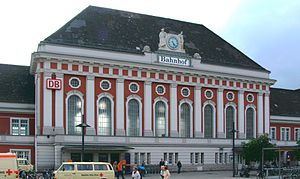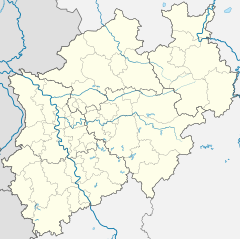
Back محطة هام ARZ Hamm (Westfalen) Hauptbahnhof German Bahnhof Hamm (Westfalen) Hungarian ハム駅 Japanese Station Hamm (Westf) Dutch Hamm (Westfalen) Hauptbahnhof Polish Вокзал Хамм Russian
Hamm (Westf) Hauptbahnhof (often abbreviated Hamm (Westf) or simply Hamm (W)) is a railway station situated in the city of Hamm in the German state of North Rhine-Westphalia. It is notable for its station building inspired by art deco and Gründerzeit building styles. The station is one of the important InterCityExpress rail hubs in the eastern Ruhr area and is among the high-profile buildings of Hamm. Until the decline of rail freight after the Second World War, it featured one of Europe's largest marshalling yards.[2]
- ^ "Fahrtauskunft". Westfalentarif. Retrieved 18 May 2020.
- ^ Gohlke, Reiner (1986). Jahrbuch des Eisenbahnwesens (in German). Hestra-Verlag.


